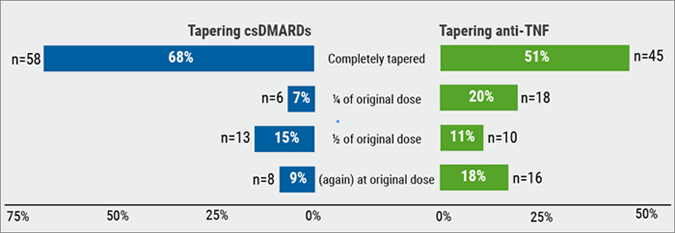https://doi.org/10.55788/b2090308
Effective DMARD treatment controls disease activity, but psychosocial stress such as depression and fatigue often impacts a patient´s life despite low disease activity [1,2]. “Some of the psychological stress aspects of the disease are still there despite DMARD therapy properly controlling the inflammation, and for those patients, we try to offer a digital intervention tool to optimise their mental health,” explained Prof. Frank Behrens (Goethe-University & Fraunhofer ITMP, Germany) [1].
RECLARIT is an internet-based health app designed for people with RA. The app provides methods and exercises –often relying on cognitive-behavioural therapy– and follows a holistic approach to support patients in enhancing their psychological quality-of-life. To evaluate the app’s effectiveness, Prof. Behrens and colleagues conducted a 2-armed randomised-controlled trial including 354 adult patients with RA assigned to use RECLARIT in addition to standard-of-care or standard-of-care alone.
The primary endpoint was the change in health-related quality-of-life (HRQoL) from baseline to month 3, as measured by the SF-36 Mental Component Summary (MCS) score. Secondary endpoints included depression, anxiety, fatigue, social work-related functioning, pain, physical function, and safety. The participants had longstanding RA, and about 50% were treated with biologics or a JAK inhibitor. “Unfortunately, no proper disease activity measurements were available in this study,” Prof. Behrens said.
At 3 months, SF-36 MCS was significantly higher in those using the app versus standard-of-care alone (38.6 vs 35.7; P=0.014), and this effect was maintained at 6 months (39.4 vs 36.4; P=0.02; see Figure). Moreover, both fatigue and depression significantly improved with the use of the digital health app. No difference was observed in pain or physical function. “This is more an area where we would expect to see effects with our pharmacological therapy,” Prof. Behrens commented.
Figure: Psychological health-related quality-of-life improved significantly over 6 months in patients using the app [3]

SF-36 MCS, Mental Component Summary 36.
The app can serve as a scalable and easily accessible option to reduce patients’ psychological distress by providing them with disease management and coping strategies. “We believe that adding this application to proper DMARD therapy might have some positive impact on the mental health of our patients,” Prof. Behrens concluded.
- Dougados M, et al. Ann Rheum Dis 2014;73:62-8.
- Pope JE. RMD Open 2020;6:e001084
- Jacob G, et al.A cognitive behavioural digital health application is effective in improving psychological quality of life in patients with rheumatoid arthritis. OP0097, EULAR 2024 Congress, 12–15 June, Vienna, Austria.
Copyright ©2024 Medicom Medical Publishers
Posted on
Previous Article
« Daratumumab shows promise in systemic lupus erythematosus Next Article
Macrophage profiling in synovial tissue predicts treatment response in RA »
« Daratumumab shows promise in systemic lupus erythematosus Next Article
Macrophage profiling in synovial tissue predicts treatment response in RA »
Table of Contents: EULAR 2024
Featured articles
Advanced therapies show promising results in PsA real-world study
Small protein targeting IL-17A effective in PsA management
Late-breaking Abstracts
Nipocalimab meets primary endpoint in Sjögren’s syndrome
Advanced therapies show promising results in PsA real-world study
Dual IL-17A/F blocker significantly reduces spinal radiographic progression in radiographic axSpA
Small protein targeting IL-17A effective in PsA management
Spotlight on Rheumatoid Arthritis
New JAK1 inhibitor outperforms placebo in active RA
Macrophage profiling in synovial tissue predicts treatment response in RA
Innovative app boosts mental health in patients with RA
What is New in Lupus and Scleroderma
Daratumumab shows promise in systemic lupus erythematosus
Severe lung involvement in SSc linked to anti-Ro/SSA antibodies
Early treatment with ambrisentan might prevent PAH development in patients with SSc
Crystal-related Disorders in 2024
More patients hit their uric acid target with febuxostat and ruzinurad combination
Tophaceous gout at higher mortality risk than non-tophaceous gout
JAK Inhibition in Giant Cell Arteritis
Is JAK inhibition the right choice for patients with relapsing giant cell arteritis?
Giant cell arteritis: Upadacitinib may be an upcoming treatment option
Spotlight on Other Indications
AxSpA: Higher comorbidity burden worsens radiographic progression
Hope for a durable effective injection therapy in knee osteoarthritis
Dermatomyositis: Triple therapy with tacrolimus beats cyclosporin regimen
Best of the Posters
Less fracture risk with denosumab than bisphosphonates in pre-treated osteoporosis
Low IL-18: a hidden culprit of long COVID in patients with autoimmune disease
Stopping DMARDs? These key factors predict RA flares
Related Articles

November 22, 2021
ACR 2021 Highlights Podcast

© 2024 Medicom Medical Publishers. All rights reserved. Terms and Conditions | Privacy Policy
HEAD OFFICE
Laarderhoogtweg 25
1101 EB Amsterdam
The Netherlands
T: +31 85 4012 560
E: publishers@medicom-publishers.com

